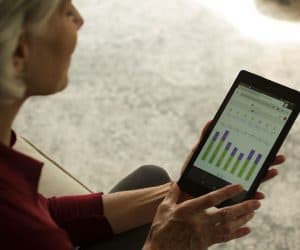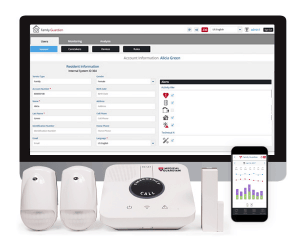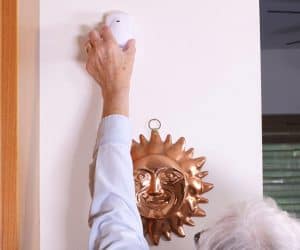The Family Guardian is no longer being offered by Medical Guardian.
Please see our Medical Guardian Review for the latest product offerings from Medical Guardian.
If you aren’t caring for an aging loved one, you likely know someone who is. Informal caregiving, or unpaid caregiving by family members or friends, is increasingly common for today’s older adults. In fact, the Family Caregiver Alliance estimates that 1 in 6 Americans who are working full or part-time also have some type of caregiving duties for an aging family member. Even more shocking is that just over half (56%) report that their work supervisor knows about their additional role in their personal life.
Fortunately, Family Guardian provides long-distance caregivers peace of mind, as well as a glimpse into the life of their loved one. Read our Medical Guardian reviews for a full product breakdown and pricing.
What is Long-Distance Caregiving?

The Family Guardian is an excellent resource for long-distance caregivers Source: Medical Guardian
Most family members do not live with their aging loved ones. Instead, most informal caregivers participate in long-distance caregiving tasks. The term “long-distance” does not necessarily mean the caregiver lives hundreds or thousands of miles away. Instead, long-distance caregivers can live in the same town as the loved one they care for. The term simply references that most of the time, long-distance caregivers cannot stop by to check in on their loved ones multiple times throughout the day.
Long-distance caregiving is increasingly common. Sometimes, families are separated because the senior has chosen to retire in a different state. Other times, family members may live nearby but cannot provide the daily assistance or safety checks their loved one may need to remain independent at home. In any case, long-distance caregivers share similar frustrations and challenges.
As with any type of caregiving, long-distance caregiving comes with its own set of challenges and frustrations. Being unable to personally check-in on a loved one who lives at home alone or with a partner can make any caregiver feel uneasy at times. Caregivers can worry about:
- Coordination of meal deliveries, grocery shopping, or other nutritional needs
- Coordination of medical appointments and follow-ups
- Correct and safe medication management
- Socialization (or lack of it)
- Security and safety
- Response to falls and other emergency situations
Family Guardian Offers a Solution

The Family Guardian system includes sensors for the home as well as a comprehensive app for the family Source: Medical Guardian
Fortunately, long-distance caregivers have access to more solutions than they did just decades ago. Now, caregivers can take advantage of organizational apps that can store important information and highlight upcoming events on a calendar. Apps like Caring Village or LotsaHelpingHands are designed to increase coordination and communication, giving caregivers the chance to loop in other neighbors or family members as needed.
When it comes to falls and other emergencies, most long-distance caregivers are familiar with the more traditional fall alert necklaces. These systems give peace of mind to seniors and their family members, but they don’t come without potential issues. For example, if the senior forgets to put on the pendant and falls without it on, they may not be able to access the emergency response they need. Or, if the senior falls outside of the pendant range, they may not be able to contact help.
Fortunately, technology has found a way to increase communication to not only detect falls and alert first responders but also to potentially prevent falls from happening in the first place through routine tracking. Family Guardian, from the Medical Guardian line, is an excellent option for caregivers to consider.
About Family Guardian
A part of the Medical Guardian family of products, Family Guardian provides solutions for the senior as well as the long-distance caregiver. The system begins with the technology, the Base Station which serves as the monitoring home base, Door Sensors, Activity Sensors, and a Medical Alert Help Button. Together, these devices work in harmony to monitor the senior’s routines and report any potential changes or concerns.
In addition to traditional medical monitoring via the Base Station, the Family Guardian system goes beyond other products with the addition of the app. Long-distance caregivers, as well as the senior, can download the app to their smartphone or device to receive information about what’s happening in the life of their loved one.
The Family Guardian app compiles data daily and sends it to designated caregivers, which can help to notice potential problems or changes in household activity. Further, the app can alert caregivers when doors are opened and closed, which can be especially helpful for seniors living with early-stage dementia or other cognitive loss.
Finally, the Family Guardian system works within 1,300 feet of the Base Station, which means if your loved one falls in the backyard, you’ll have a better chance of knowing about it sooner.
Fast Facts About Family Guardian

Sensors are placed in the kitchen and bathroom to help monitor activity throughout the day Source: Medical Guardian
The Family Guardian offers the Base Station, Door Sensor, Activity Sensors, and Alert Button as the foundation of the product. However, caregivers can enhance protection and communication by adding on other devices like alert pendants, lock boxes, or wall-mounted buttons.
Here are a few additional facts about the system:
- The coverage area, 1,300 feet, is nearly the size of 4 football fields although walls and other obstacles can impact range.
- When the senior pushes their alert button, they are automatically connected with a trained operator to help with the next steps.
- Trained operators are available to assist with emergency and non-emergency concerns.
- Medical alert monitoring is available 24 hours per day, 7 days per week.
- Place the Activity Sensors in the kitchen and bathroom for the best reflection of household activity.
- Back-up battery life is up to 32 hours, which eliminates the worry of power outages.
- The Family Guardian app is available for iPhone or Android devices.
- The system costs less than $3 per day.
If you are a long-distance caregiver, you aren’t alone even though it can feel like it sometimes. Technology is readily available to make your coordination and advocacy duties a bit easier, whether you are monitoring your loved one’s safety and well-being from two blocks away or from 2,000 miles away.


